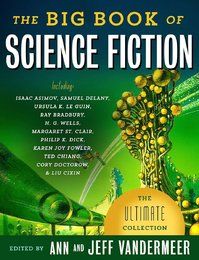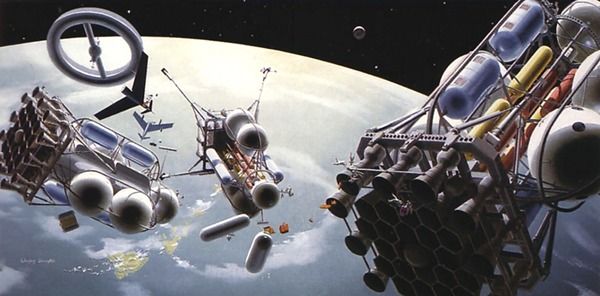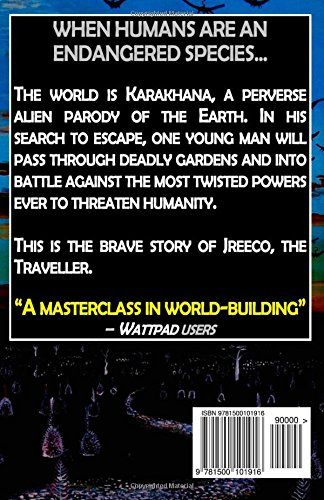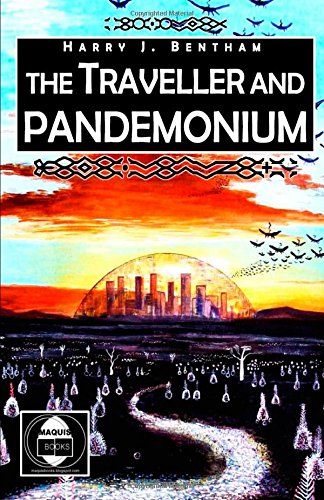In Unexpected Futurist, we profile the lesser known futurist side of influential individuals. This episode’s unexpected time-traveler: Benjamin Franklin. Ben Franklin was an inventor, observer, electricity pioneer, and serial experimenter, so it’s not entirely surprising he looked to the future. But it turns out he was looking to the far, far future. In 1780 he wrote a letter to a friend in which he lamented that he was born during the dawn of science.
Tag: Science Fiction

‘The Big Book of Science Fiction’ a portal to endless reading pleasure — By Jim Higgins | Journal Sentinel
““The Big Book of Science Fiction” doesn’t codify a genre the way the Vandermeers’ previous mega-anthology “The Weird” did. Many good science-fiction anthologies exist, though I can’t think of any quite this large or this internationally inclusive.”

The Latest in Science Fiction and Fantasy — By N.K. Jemisin | The New York Times
“In the Three Worlds, sentient nonhuman species are a dime a dozen, and the detritus of countless lost civilizations is embedded in a lush, magic-infused landscape.”

‘Imagined Futures:’ Pivot Art + Culture’s Newest Exhibition | Vulcan Inc.
“Vulcan Inc. today announced a new exhibition of nearly 60 objects related to science fiction and the history of space exploration – Imagined Futures: Science Fiction, Art, and Artifacts from the Paul G. Allen Family Collection – that will be on view at its 3,000-square-foot flexible concept space, Pivot Art + Culture beginning April 7, 2016. The exhibition, curated by Ben Heywood, runs through July 10, 2016.”
100 Year Starship Celebrates Awarding First Interstellar Writing Prize during Science Fiction Stories Night
Inaugural Canopus Award Winners to be Announced
Award-winning authors and social and physical science experts will gather at Science Fiction Stories Night and honor winners of the first annual Canopus Awards for Interstellar Writing on Halloween Eve during 100 Year Starship’s ® (100YSS®) fourth annual public symposium in Silicon Valley from October 29-November 1, at the Santa Clara Marriott in Santa Clara, California.
100 Year Starship® (100YSS®) is the independent, long-term global initiative led by former astronaut Dr. Mae Jemison to ensure the capability for human travel beyond our solar system exist within the next 100 years and the advances are applied to enhance life here on Earth every step of the way.
Science fiction frequently leads to science fact. In fact, the extremes of scientific discovery today fuel the imagination and possibilities for science fiction writers tomorrow who catapult them into our collective realm of possibility with their stories. Join the discussion on Science Fiction Stories Night with awarding winning authors, including Nebula Award winner Pat Murphy (The Falling Woman, Bones, and Points of Departure); Juliette Wade (short fiction published in Analog Magazine and Clarkesworld); Brenda Cooper (Edge of Dark and Beyond the Waterfall Door); and, Jacob Weisman, publisher of Tachyon (titles have won the Nebula, Hugo, Sturgeon, Locus, Mythopoeic and World Fantasy Awards).
In addition, 100YSS will announce the inaugural winners of its Canopus Awards for Excellence in Interstellar Writing™. The awards recognize and highlight the importance of great story telling to propel the Interstellar movement. Winners will be named in the categories of “Previously Published Long-Form Fiction;” “Previously Published Short-Form Fiction;” “Original Fiction;” and, “Original Non-Fiction.” (See below for list of finalists.)
With the timely theme of “Finding Earth 2.0,” the symposium invites the public to explore the game-changing processes required to indisputably find a planet outside our solar system capable of supporting Earth-evolved life. Symposium attendees will examine what specific capabilities and systems—scientific, technical and societal—will be needed and impacted over the next five to 25 years to definitively identify at least one Earth 2.0.
A powerful four-day event, the symposium will feature experiences involving transdisciplinary approaches that require attendees to stretch their imaginations and appreciate today’s cutting-edge technologies. They will be challenged to discuss and take action on thought-provoking frontiers of science, civilization, space, technology, society, music and art, both now and in the future.
Organized by the global 100YSS team, the 2015 Public Symposium will bring together experts, enthusiasts, students, celebrities, innovators, educators, and thought leaders from around the world.
Other participants include renown scientists, thinkers, artists, policy makers and celebrities like George Whitesides, CEO, Virgin Galactic; Mickey Fisher, Creator, EXTANT; Lou Friedman, Ph.D. astronomer and co-founder of the Planetary Society; Jill Tarter, Ph.D., co-founder of SETI Institute, astronomer and TED Prize winner; Mae Jemison, M.D., physician, engineer and entrepreneur; Hakeem Oluseyi, Ph.D., TED Fellow and Chief Science Officer, Discovery Channel; Amy Millman, CEO and co-founder Springboard Enterprises; Mmboneni Muofhe, Deputy Director, South African Department of Science and Technology; Pam Contag, Ph.D., CEO, Molecular Sciences Institute; Pete Worden, Ph.D., Chairman, Breakthrough Prize Foundation and former Director, NASA Ames; and, Kurt Zatloukal, M.D., Professor, Medical University of Graz (Austria), among others.
Dr. Jemison stated, “100 Year Starship is building an inclusive movement that spurs us to achieve the extraordinary — human travel beyond our solar system. Simultaneously, 100 Year Starship is applying the radical leaps in knowledge, technologies, social systems and other capabilities learned and discovered to improve life here on Earth today. While it might take years to uncover these Earth-bound solutions, it might not. However, we might not find them at all without the unique perspective afforded by such an audacious goal of interstellar travel.”
For more information or to register to attend, visit: http://2015.symposium.100yss.org/
About 100 Year Starship®
100 Year Starship® (100YSS), an independent, non-governmental, long-term initiative to ensure the capabilities for human interstellar flight exist as soon as possible, and definitely within the next 100 years. 100YSS was started in 2012 with seed-funding through a competitive grant from DARPA (Defense Advanced Research Projects Agency) and support from NASA (National Aeronautics and Space Administration) for the purpose of fostering the type of explosive innovation and technology and social advances born from addressing such an incredible challenge. 100YSS is part of the Dorothy Jemison Foundation for Excellence. For more information, visit www.100yss.org.
FIRST ANNUAL CANOPUS AWARD™ FOR EXCELLENCE IN INTERSTELLAR WRITING
FINALISTS
In the category of “Previously Published Long-Form Fiction” (40,000 words or more):
- “Other Systems” by Elizabeth Guizzetti
- “The Creative Fire” by Brenda Cooper
- “InterstellarNet: Enigma” by Edward M. Lerner
- “Aurora” by Kim Stanley Robinson
- “Coming Home” by Jack McDevitt
In the category of “Previously Published Short-Form Fiction” (between 1,000 and 40,000 words):
- “Race for Arcadia” by Alex Shvartsman
- “Stars that Make Dark Heaven Light” by Sharon Joss
- “Homesick” by Debbie Urbanski
- “Twenty Lights to the Land of Snow” by Michael Bishop
- “Planet Lion” by Catherynne M. Valente
- “The Waves” by Ken Liu
- “Dreamboat” by Robin Wyatt Dunn
In the category of “Original Fiction” (1,000–5,000 words):
- “Landfall” by Jon F. Zeigler
- “Project Fermi” by Michael Turgeon
- “Everett’s Awakening” by Ry Yelcho
- “Groundwork” by G. M. Nair
- “His Holiness John XXIV about Father Angelo Baymasecchi’s Diary” by Óscar Garrido González
- “The Disease of Time” by Joseph Schmidt
In the category of “Original Non-Fiction” (1,000–5,000 words):
- “Why Interstellar Travel?” by Jeffrey Nosanov
- “Finding Earth 2.0 from the Focus of the Solar Gravitational Lens” by Louis D. Friedman and Slava Turyshev

Dune, 50 years on: how a science fiction novel changed the world — By Hari Kunzru | The Guardian
“It has sold millions of copies, is perhaps the greatest novel in the science-fiction canon and Star Wars wouldn’t have existed without it. Frank Herbert’s Dune should endure as a politically relevant fantasy from the Age of Aquarius.”

Political futurism, ethics energized by sci-fi
Since Maquis Books published The Traveller and Pandemonium, a novel authored by me from 2011–2014, I have been responding as insightfully as possible to reviews and also discussing the book’s political and philosophical themes wherever I can. Set in a fictional alien world, much of this book’s 24 chapters are politically themed on the all too real human weakness of infighting and resorting to hardline, extremist and even messianic plans when faced with a desperate situation.
The story tells about human cultures battling to survive in a deadly alien ecosystem. There the human race, rather than keeping animals in cages, must keep their own habitats in cages as protection from the world outside. The human characters of the story live out a primitive existence not typical of science-fiction, mainly aiming at their own survival. Technological progress is nonexistent, as all human efforts have been redirected to self-defense against the threat of the alien predators.
Even though The Traveller and Pandemonium depicts humanity facing a common alien foe, the various struggling human factions still fail to cooperate. In fact, they turn ever more hostilely on each other even as the alien planet’s predators continue to close in on the last remaining human states. At the time the story is set, the human civilization on the planet is facing imminent extinction from its own infighting and extremism, as well as the aggressive native plant and animal life of the planet.
The more sinister of the factions, known as the Cult, preaches the pseudo-religious doctrine that survival on the alien world will only be possible through infusions of alien hormones and the rehabilitation of humanity to coexist with the creatures of the planet at a biological level. However, there are censored side effects of the infusions that factor into the plot, and the Cult is known for its murderous opposition to anyone who opposes its vision.
The only alternative seems to be a second faction, but it is equally violent, and comes under the leadership of an organization who call themselves the Inquisitors. In their doctrine, humans must continue to isolate themselves from the alien life of the planet, but this should extend to exterminating the alien life and the aforementioned Cult that advocates humans transmuting themselves to live safely on the planet.
I believe that this aspect of the story, a battle between two militant philosophies, serves well to capture the kind of tension and violent irrationality that can engulf humanity in the face of existential risks. There is no reason to believe that hypothetical existential risks to humanity such as a deadly asteroid impact, an extraterrestrial threat, runaway global warming, alien contact or a devastating virus would unite the planet, and there is every reason to believe that it would divide the planet. It is often the case that the more argument there is for authority and submission to a grand plan in order to survive, the greater the differences of opinion and the greater the potential for divergence and conflict.
Social habits, politics, beliefs and even the cultural trappings of the different human cultures clinging to the alien planet are fully represented in the book. In all, the story has had significant time and care put into refining it to create a compelling and believable depiction of life in an inhospitable parallel world, and readers remarked in reviews that it is a “masterclass in world-building”.
The central character of the story, nicknamed the Traveler, together with his companion, do not really subscribe to either of the extremist philosophies battling over humanity’s fate on the alien planet, but their ideas may be equally strange. Instead, they reject the alien world in which they live. With an almost religious naïveté, they are searching for a “better place”. It is through this part of the plot that the concepts of religious faith and hope are visited. Of course, at all times the reader knows they are right – there is a “better place” only not the religious kind. Ultimately, the quest is for Earth, although the characters have never heard of such a place and have only inferred that it might somehow exist and represent an escape from the hostile planet where they were born.
Reviewers have acknowledged that by inverting the relationship of humanity and nature so that nature is on the advance and humans are receding and diminishing in the setting of this science-fiction novel, a unique and compelling setting is created. I believe the story offers my best exploration of a number of political and ethical themes, such as how people feel pressured to choose between hardline factions in times of extreme desperation and in the face of existential threats. Science fiction is a worthy medium in which to express and explore not only the future, but some of the most troubling political and philosophical scenarios that have plagued humanity’s past.
Debunking Time Travel (Looper)
Previous Post in this Debunking Series.
I just watched Looper the movie. It is such a good movie and a great story. But then I’m biased. Anything with Bruce Willis is a great movie. Bruce Willis is getting older, which reminds me so am I!
For those who have not watched Looper I won’t give the story away … Looper is a must watch for science fiction fans. And there were other great movies and episodes about time travel. The three Back to the Future, and the Star Trek episodes, for starters.
That was the good news, and now for the bad news. Time travel is impossible. The mathematics behind time travel is excellent, but the physics is not. In contemporary physics, the mechanism of time travel requires wormholes. You get into a wormhole on one side and you pop out the other side either in the future or in the past, depending on what the wormhole was designed to do.
I did some digging, and found the Polchinski’s billiard ball paradox which is a version of the matricide paradox (travelling back through time before one’s birthday and killing one’s mother, hey what about father?) without the free will component. “A billiard ball sent through a wormhole which sends it back in time. In this scenario, the ball is fired into a wormhole at an angle such that, if it continues along that path, it will exit the wormhole in the past at just the right angle to collide with its earlier self, thereby knocking it off course and preventing it from entering the wormhole in the first place.”
Then Kip Thorne’s students came up another solution “to avoid any inconsistencies, by having the ball emerge from the future at a different angle than the one used to generate the paradox, and deliver its younger self a glancing blow instead of knocking it completely away from the wormhole, a blow which changes its trajectory in just the right way so that it will travel back in time with the angle required to deliver its younger self this glancing blow.”
Add to this second scenario that one collects the older billiard ball in a basket. Of course there are some boundaries driven by conservation of mass and when the wormhole was created, that constraint what is observed. But this then raises some questions. How many balls are there in the basket at the start? How many billiard balls does one observe in the middle of this experiment? Think parallel processing not sequential logic.
And, what can I do?” That is, since cause and effect no longer have a consistent relationship, if the basket fills up with billiard balls before I set off the experiment, can I choose not to set off the experiment?
It is sufficient to stop here to make the case that time travel is not possible.
I’m sure Kip Thorne, his students and many, many others are doing good work to develop theoretical models. I hope these older theoretical wormhole models would evolve to new ‘tunneling’ models that do not allow for inconsistent relationships between cause and effect. And these new ‘tunneling’ models will one day allow us to do interstellar travel using some kind of tunneling technology.
Right now time travel is just too easy to debunk. We are not there, yet.
The next in the Debunking Series.
—————————————————————————————————
Benjamin T Solomon is the author & principal investigator of the 12-year study into the theoretical & technological feasibility of gravitation modification, titled An Introduction to Gravity Modification, to achieve interstellar travel in our lifetimes. For more information visit iSETI LLC, Interstellar Space Exploration Technology Initiative.
Solomon is inviting all serious participants to his LinkedIn Group Interstellar Travel & Gravity Modification.
